Medications in Anxiety Disorders – A Guide
By Dr. BL Lim (guest contributor)
Like Depression, Anxiety Disorders occurs commonly in the general population. Studies have shown that as many as one in six people will suffer from an episode of an Anxiety Disorder once in their lifetime. Anxiety Disorders refer to the following psychiatric conditions:
Generalised Anxiety Disorder (GAD)
Panic Disorder
Post Traumatic Stress Disorder
Social Anxiety
Obsessive Compulsive Disorder
Phobias
Patients suffering from Anxiety Disorders who have been started on antidepressant medications often ask me, “Doctor, you prescribed me antidepressants, am I depressed?”
Antidepressants

(photo: Amanda Hatfield)
Whilst many people who suffer from anxiety may concurrently have depression as well, this is not always the case. Antidepressant medications have a wide spectrum of activity and are effective in the treatment of anxiety, pain disorders, ADHD and other psychiatric disorders. These medications are called antidepressants as they were first developed and used in the treatment of depression. Therefore, having been prescribed an antidepressant does not mean that you are suffering from depression in any way.
The classes of antidepressants include:
1) Selective Serotonin Reuptake Inhibitors, eg. Escitalopram, Setraline, Fluoxetine, etc
2) Serotonin and Noradrenaline Reuptake Inhibitors eg. Duloxetine, Venlafaxine
3) Tricyclics Antidepressants, eg. Amitriptylline, Clomipramine
The type of antidepressants used depends on the type of symptoms you are experiencing, previous use of antidepressants and the side effects profile of these medications. Antidepressants can cause side effects in about 5% of people who take them. These side effects are short term and reversible. I will discuss them in another article as users are often worried about side effects and they warrant a full article to debunk many of the fears related to them.
It is important to note that antidepressants usually take about one to two weeks to start working and their effects are gradual. As such some use of tranquillizers may be needed in the short term.
Tranquillizers
Minor tranquillizers like benzodiazepines (eg. alprazolam and lorazepam) will help to ease anxiety quickly. However, they can potentially cause dependency issues if abused and have to be given judiciously and mostly only during the start of treatment while we are allowing the antidepressants to take effect. Very low doses of major tranquillizers like Quetiapine and Risperidone may be used sometimes to help manage the anxiety. It is important to remember that the mainstay of treatment is still antidepressants and tranquillizers are for short term use.
Safety of Medications
From extensive research and experience, the medications used in anxiety disorders are safe when used as directed. Side effects are short lived and at best troublesome.
Other Treatments

(photo: U. S. Army)
Various forms of therapy are also useful with Anxiety Disorders. They can be considered as first line when the anxiety is mild or they can be used in conjunction with medications. Some patients do find it hard to initiate therapy and to follow through with the homework of challenging their negative thoughts when they are anxious and may need a period of stabilization with medication before therapy can be commenced.
Duration of Treatment
Many worry that they will need to take medications forever once started. This is a misconception. Many people with anxiety disorder suffer only one episode. The medications will ease the symptoms and with time (depending on their condition) they will come off medications. However, if you have had many episodes of anxiety disorders, it may be beneficial for you to stay on medications on a longer term.
By Dr Lim Boon Leng, a psychiatrist in private practice from Dr BL Lim Centre for Psychological Wellness, Gleneagles Medical Centre. Via HealthMatters.sg, a Singapore Health and Fitness blog that aims to help you lose weight, keep fit, and live healthy. Click here to get our free guide “Eat Your Way to Health – Secrets of a Healthy Diet”.
Related Articles
5 Common Misconceptions about Antidepressants (at HealthMatters.sg)
9 Common Questions About ADHD in Children (at HealthMatters.sg)



